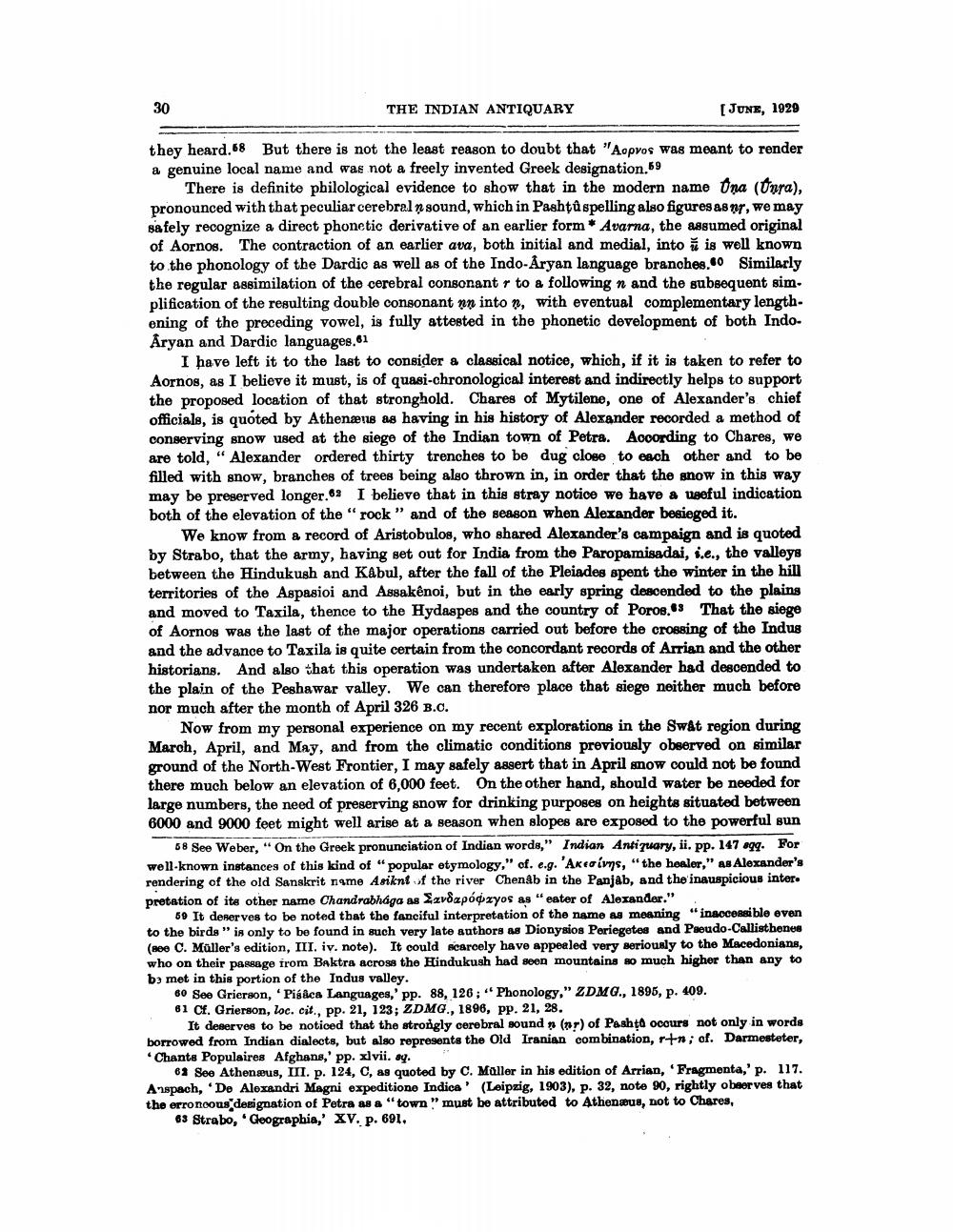________________
30
THE INDIAN ANTIQUARY
[JUNE, 1929
they heard.68 But there is not the least reason to doubt that "Aopvos was meant to render a genuine local name and was not a freely invented Greek designation.59
There is definite philological evidence to show that in the modern name ona (Unra), pronounced with that peculiar cerebral nsound, which in Pashtû spelling also figures asur, we may safely recognize a direct phonetic derivative of an earlier form * Avarna, the assumed original of Aornos. The contraction of an earlier ava, both initial and medial, into x is well known to the phonology of the Dardio as well as of the Indo-Aryan language branches. Similarly the regular assimilation of the cerebral consonant r to a following n and the subsequent sim. plification of the resulting double consonant nn inton, with eventual complementary lengthening of the preceding vowel, is fully attested in the phonetic development of both IndoAryan and Dardic languages. 61
I have left it to the last to consider a classical notice, which, if it is taken to refer to Aornog, as I believe it must, is of quasi-chronological interest and indirectly helps to support the proposed location of that stronghold. Chares of Mytilene, one of Alexander's chief officials, is quoted by Athenæns as having in his history of Alexander recorded a method of conserving snow used at the siege of the Indian town of Petra. According to Chares, we are told, “ Alexander ordered thirty trenches to be dug close to each other and to be filled with snow, branches of trees being also thrown in, in order that the snow in this way may be preserved longer.62 I believe that in this stray notice we have a weful indication both of the elevation of the "rock" and of the season when Alexander besieged it.
We know from a record of Aristobulos, who shared Alexander's campaign and is quoted by Strabo, that the army, having set out for India from the Paropamisadai, i.e., the valleys between the Hindukush and Kabul, after the fall of the Pleiades spent the winter in the hill territories of the Aspasioi and Assakênoi, but in the early spring descended to the plains and moved to Taxila, thence to the Hydaspes and the country of Poros." That the siege of Aornos was the last of the major operations carried out before the crossing of the Indus and the advance to Taxila is quite certain from the concordant records of Arrian and the other historians. And also that this operation was undertaken after Alexander had descended to the plain of the Peshawar valley. We can therefore place that siege neither much before nor much after the month of April 326 B.C.
Now from my personal experience on my recent explorations in the SwAt region during Maroh, April, and May, and from the climatic conditions previously observed on similar ground of the North-West Frontier, I may safely assert that in April snow could not be found there much below an elevation of 6,000 feet. On the other hand, should water be needed for large numbers, the need of preserving snow for drinking purposes on heights situated between 6000 and 9000 feet might well arise at a season when slopes are exposed to the powerful sun
58 See Weber, "On the Greek pronunciation of Indian words," Indian Antiquary, ii. pp. 147 agg. For well-known instances of this kind of "popular etymology," of. e.g. 'Akerims, "the healer," As Alexander's rendering of the old Sanskrit name Asiknt of the river Chenåb in the Panjab, and the inauspicious inter. pretation of its other name Chandrabhága as aveapóqzyos as "eater of Alexander."
60 It deserves to be noted that the fanciful interpretation of the name as meaning "inaccessible even to the birds" is only to be found in such very late authors as Dionysios Periegetes and Pueudo-Callisthenes (100 C. Müller's edition, III. iv. note). It could scarcely have appealed very seriously to the Macedonians, who on their passage from Baktra across the Hindukush had seen mountains so much higher than any to bu met in this portion of the Indus valley.
60 See Grierson, Pisaca Languages, pp. 88, 126 : “ Phonology." ZDMO., 1896, p. 409. 61 Cf. Grierson, loc. cit., pp. 21, 123, ZDMG., 1896, pp. 21, 28.
It deserves to be noticed that the strongly cerebral sound (tr) of Pashtocours not only in words borrowed from Indian dialects, but also represents the Old Iranian combination, r+n; of. Darmesteter, "Chants Populaires Afghans,' pp. xlvii. ay.
62 See Athenæus, III. p. 124, C, as quoted by C. Müller in his edition of Arrian, 'Fragmenta,' p. 117. Anspach, 'De Alexandri Magni expeditione Indica' (Leipzig, 1903), p. 32, note 90, rightly observes that the erroneous designation of Petra as a "town" must be attributed to Athensus, not to Chares,
63 Strabo, Geographia, XV. p. 691,




